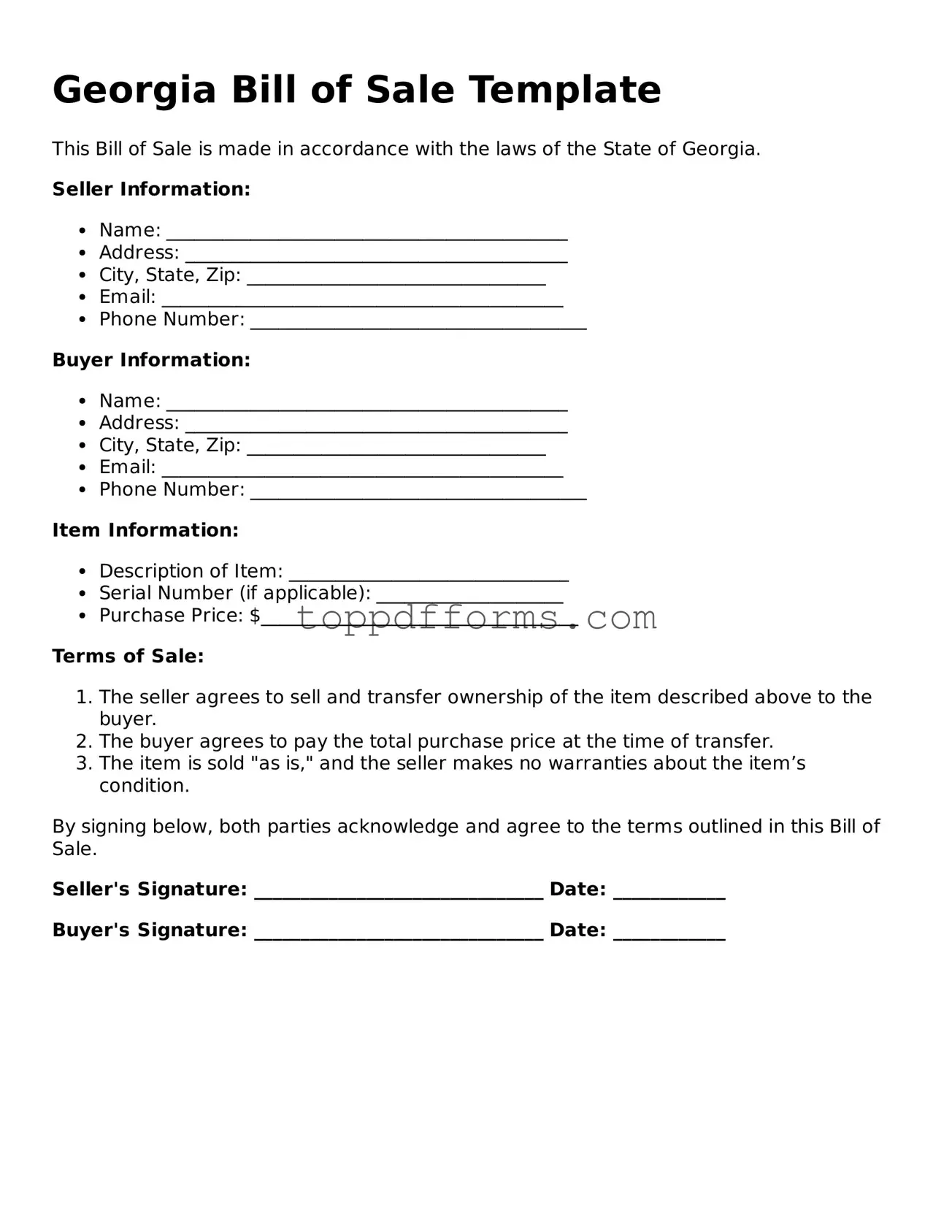Bill of Sale Document for Georgia State
Things You Should Know About This Form
What is a Georgia Bill of Sale?
A Georgia Bill of Sale is a legal document that records the transfer of ownership of personal property from one party to another. This form is essential for transactions involving vehicles, boats, and other tangible items. It serves as proof that the buyer has purchased the item and that the seller has relinquished ownership.
Do I need a Bill of Sale for every transaction in Georgia?
While a Bill of Sale is not required for all transactions, it is highly recommended for significant purchases, such as vehicles or expensive items. Having a Bill of Sale can protect both the buyer and seller by providing a written record of the transaction, which can be crucial in case of disputes or for tax purposes.
What information should be included in a Georgia Bill of Sale?
A comprehensive Georgia Bill of Sale should include the following details: the names and addresses of both the buyer and seller, a description of the item being sold (including its condition), the purchase price, the date of the transaction, and any warranties or guarantees. Both parties should sign the document to validate it.
Is a Bill of Sale required to register a vehicle in Georgia?
Yes, a Bill of Sale is typically required when registering a vehicle in Georgia. The Georgia Department of Revenue requires this document to prove ownership when transferring a vehicle title. It helps ensure that the buyer has the legal right to register the vehicle in their name.
Can I create my own Bill of Sale in Georgia?
Absolutely. You can create your own Bill of Sale in Georgia, as long as it includes all necessary information and is signed by both parties. However, using a template or a pre-made form can simplify the process and ensure that you don’t miss any critical details.
Do I need a notary for a Bill of Sale in Georgia?
A notary is not required for a Bill of Sale in Georgia; however, having the document notarized can add an extra layer of authenticity. This step may be beneficial if you anticipate any disputes or if you want to ensure that the document holds up in court.
How long should I keep a Bill of Sale?
It is advisable to keep a Bill of Sale for as long as you own the item. After selling it, retain the document for at least a few years. This practice can be helpful for tax purposes or if any legal issues arise regarding the sale.
PDF Overview
| Fact Name | Description |
|---|---|
| Definition | A Georgia Bill of Sale is a legal document used to transfer ownership of personal property from one person to another. |
| Governing Law | The Bill of Sale in Georgia is governed by the Official Code of Georgia Annotated (O.C.G.A.) § 10-1-200 et seq. |
| Required Information | The form typically includes the names of the buyer and seller, a description of the item being sold, and the sale price. |
| Notarization | While notarization is not required, having the document notarized can provide additional legal protection. |
| Use Cases | Commonly used for vehicles, boats, and other personal property transactions. |
| Tax Implications | Sales tax may apply to the sale of certain items, and the buyer is typically responsible for paying it. |
| Retention of Copies | Both the buyer and seller should keep a copy of the Bill of Sale for their records. |
| State-Specific Forms | Georgia provides specific templates for the Bill of Sale, which can be found online or at legal offices. |
| Legal Protection | A Bill of Sale can help protect both parties in case of disputes regarding the transaction. |
Common mistakes
When filling out the Georgia Bill of Sale form, many people overlook important details that can lead to complications later on. One common mistake is failing to provide accurate information about the buyer and seller. This includes not listing full names, addresses, or contact information. Inaccurate details can create confusion and may even invalidate the sale.
Another frequent error is neglecting to include a complete description of the item being sold. Whether it’s a vehicle, a piece of equipment, or personal property, the description should be detailed enough to identify the item clearly. Omitting critical information like the make, model, or serial number can lead to disputes down the line.
Many individuals also forget to include the purchase price. While it may seem straightforward, this detail is crucial. The purchase price not only reflects the agreement between buyer and seller but also serves as a record for tax purposes. Leaving this section blank can raise questions from tax authorities and complicate future transactions.
Finally, signatures are often missing or improperly executed. Both parties must sign the Bill of Sale to validate the transaction. If one party’s signature is missing, the document may not hold up in legal situations. Always ensure that both the buyer and seller have signed and dated the form before finalizing the sale.
Other Common State-specific Bill of Sale Forms
Michigan Bill of Sale - The document typically includes the names and addresses of both the buyer and seller.
For those interested in property transfers, a useful resource is the comprehensive guide to using Quitclaim Deed, which explains the process and considerations involved in executing this type of legal document.
Free Nc Bill of Sale - Both parties should keep a copy of the Bill of Sale for their records.
